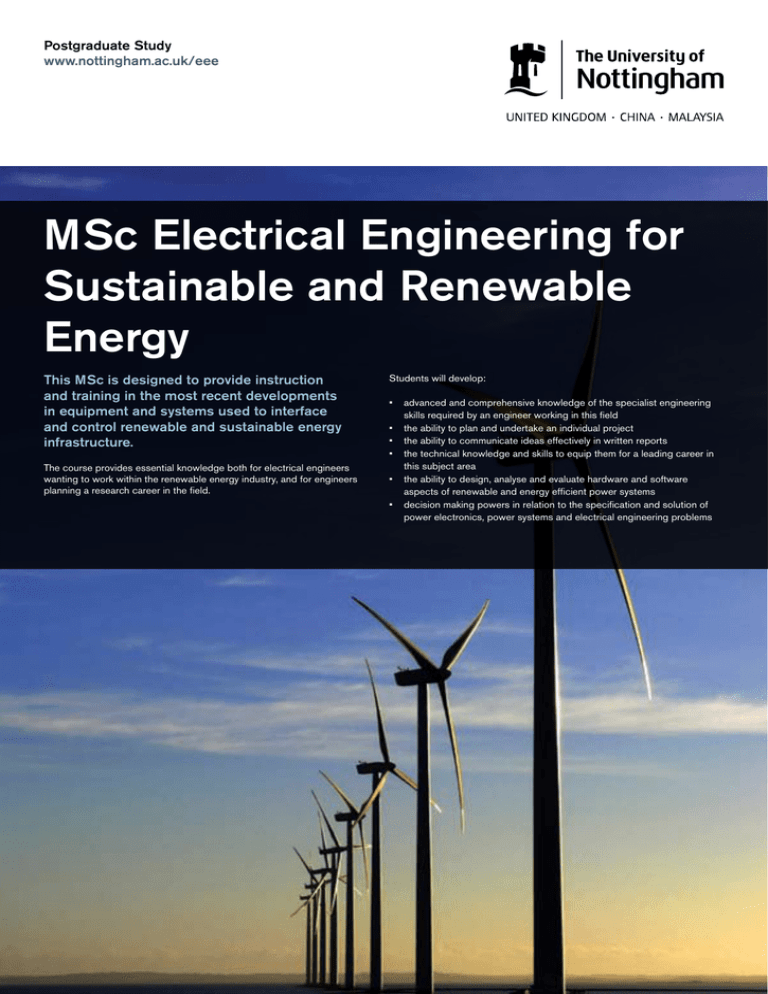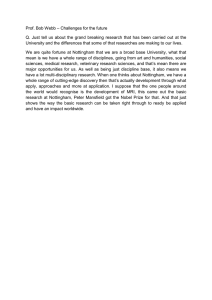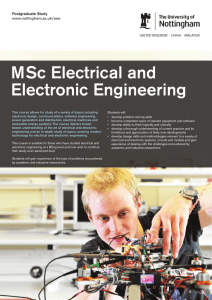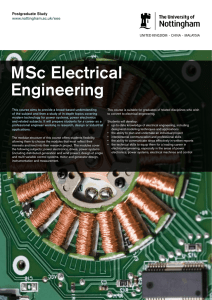
Postgraduate Study
www.nottingham.ac.uk/eee
MSc Electrical Engineering for
Sustainable and Renewable
Energy
This MSc is designed to provide instruction
and training in the most recent developments
in equipment and systems used to interface
and control renewable and sustainable energy
infrastructure.
The course provides essential knowledge both for electrical engineers
wanting to work within the renewable energy industry, and for engineers
planning a research career in the field.
Students will develop:
• advanced and comprehensive knowledge of the specialist engineering
skills required by an engineer working in this field
• the ability to plan and undertake an individual project
• the ability to communicate ideas effectively in written reports
• the technical knowledge and skills to equip them for a leading career in
this subject area
• the ability to design, analyse and evaluate hardware and software
aspects of renewable and energy efficient power systems
• decision making powers in relation to the specification and solution of
power electronics, power systems and electrical engineering problems
Postgraduate Study
www.nottingham.ac.uk/eee
MSc Electrical Engineering for Sustainable
and Renewable Energy
Course structure
This masters course is taught on a full-time basis over one year and
is also offered as a postgraduate diploma which follows the same
taught modules but does not include the research project. The course
consists of 120 credits of taught modules over autumn and spring and a
60 credit independent research project over the summer. Please be aware
modules are subject to change.
Core modules
•
•
•
•
•
•
•
•
Control Systems Design Renewable Energy Technology 1 Power Electronic Design Power Networks with Laboratory Energy Conversion for Motor & Generator Drives
FACTS and Distributed Generation Advanced AC Drives with Project Sustainable Energy Futures
Optional modules
•
•
•
•
Technologies for Wind Generation
Technologies for Hydrogen transport Economy
Renewable Energy Technology 2 Combined Heat and Power Systems Individual project
Following the successful completion of the taught modules, an
individual research project is undertaken during the summer term.
There is a wide choice of project areas, including many working on current
research in the faculty and some with collaborating industrial companies.
Previous research projects on this course have included:
• The design of a DC-DC voltage convertor with maximum power tracking
for a photovoltaic module
• Electrical modelling of a PEM fuel Cell
• Microprocessor based control of a wind turbine generator
• Optimisation of the operation of a renewable energy micro grid
Funding opportunities
Funding options can be found at:
Home and EU: www.nottingham.ac.uk/fundingPG
International: www.nottingham.ac.uk/internationalstudents/
scholarships
Employment prospects
Graduates of this course progress to many different, exciting roles including
design and development with major international companies or government
agencies, obtain consultancy posts with leading contract consultant
companies or move into successful academic careers.
Entry requirements
Candidates would usually be expected to hold at least a high 2.2 honours
degree (high lower second class honours degree) or equivalent in a related
subject from a recognised university.
English language requirements:
• IELTS score of at least 6.0 with a minimum score of 5.5 in individual
elements
Other qualifications are accepted.
How to apply
Candidates are encouraged to applied online at:
www.nottingham.ac.uk/pgstudy/apply
Contact us
For further information, please contact:
Graduate Admissions
Department of Electrical and Electronic Engineering
t: +44 (0)115 951 4081
e: eng-student-support@nottingham.ac.uk
w: www.nottingham.ac.uk/eee
The University of Nottingham has made every effort to ensure that the information in this
flyer was accurate when published. Please note, however, that the nature of the content
means that it is subject to change from time to time, and you should therefore consider
the information to be guiding rather than definitive.
© The University of Nottingham 2014. All rights reserved.




